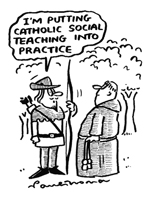Popular notions of hard-working families forking out for benefit scroungers are well wide of the mark, argues the author of a new book, which shows that virtually everyone at some point in their lives needs government support
“Welfare” has become a deeply confusing term. Originally it was about supporting people to fare well, as we wished them on parting. During the Second World War the Archbishop of Canterbury, William Temple, popularised the notion of the modern “welfare state” – what came to include the National Health Service, schools, pensions, child benefit, unemployment benefits, personal social services and social housing.
But increasingly in newspapers and political rhetoric in the United Kingdom, the word “welfare” has come to mean, often pejoratively as in the United States, cash “handouts” to those of working age who are not in paid work.
Sometimes we hear both senses used in the same sentence. In one breath we are reminded of the huge cost of the welfare state as a whole – two-thirds of all government spending, £489 billion this year (a quarter of national income). In the next breath we hear about “welfare-dependent” families who get benefits, implying that is where all the money goes. In fact only £1 out of every £12.50 we spend on the welfare state goes on out-of-work cash benefits – and that is including lone parents and those who are sick or disabled, not just unemployed people.
But that is not what people believe. Half of the population think that 40 per cent or more of benefits and tax credits go on unemployment benefits. It is actually 4 per cent – just £1 in every £70 we spend on the welfare state. At the same time, many people think that more than a quarter of all benefits, pensions and tax credits are fraudulently claimed. That would make a total of £58 billion. But this is 50 times the amount of fraud that the Department for Work and Pensions projects from its random probes.
It is not just that people believe that the money is mostly going on handouts to unemployed people when it is not. There is a wider belief that the recipients – “them” – are different. You hear this whenever people talk of “two groups” – those who benefit and those who pay. “They” are always out of work, never pay tax and get all the handouts, as opposed to “us”, who are always in work, paying tax and never getting anything out. It is bizarre that people accept this picture when we all know that it is not really like that. Every novel, every soap opera, and what we know of our own lives and those of our families, tell us that our lives change, and with that so does our relationship with the welfare state.
In my new book, I talk through the research evidence on what we know about how things change for people over different timescales – from week to week, year to year, through our life cycles, and on to the next generation.
If you look just at a snapshot of what is going on at one moment, the welfare state and the taxes that pay for it do act as a kind of giant Robin Hood – on average, those on lower incomes get more out, and those on higher incomes pay more in: to each according to their needs, from each according to their capacities, embodying what Christian and other moralities tell us should happen; as Pope Francis quotes in Evangelii Gaudium, “not to share one’s wealth with the poor is to steal from them and to take away their livelihood”.
But despite that, the UK still ends up as one of the five most unequal countries in the industrialised world. Why? Because the incomes people get from work and other private sources are so unequal: before the state intervenes, we are the third most unequal industrialised country, behind only Ireland and Chile. That is why the work of groups such as London Citizens campaigning for a living wage – “just hire” in terms of Catholic Social Teaching – is so important.
But if you move from an instant snapshot to look over whole lives, it is very different. Most of the spending goes on the NHS, pensions and schools – from which nearly everyone benefits at one time or another. If you could add it up over a whole lifetime, typical families now receive services, benefits and pensions worth around three houses. That average is much the same for the lifetime rich as the lifetime poor. The lifetime rich pay in more tax to finance it, so it does still redistribute between lifetime rich and poor – but the larger part of what it does is to redistribute to ourselves, across our own life cycles.
But it is not just over the life cycle that our lives change. Over the course of a year, only a small minority of lower-paid families with children have incomes that stay fairly flat. Incomes fluctuate because of overtime or changes in hours – more so for those on ‘‘zero hours contracts” now – but also because of term-time work, and variations in benefits and tax credits. Many of those on low incomes cope with a roller coaster of income from month to month.
And people move in and out of work. Far from a picture of those who lose their jobs then become permanently dependent on benefits, half of new Jobseeker’s Allowance claims last for no more than two months. So it goes on. Many people who are poor in one year, are not poor the next (although a minority do stay poor in the long term). Things change: children are born and later leave home (and sometimes come back); people’s working careers change and finish.
Another kind of life cycle change is how some can build up savings and others wealth. The state helps through pension tax reliefs, favourable tax treatment of owner-occupiers, and through investment incomes being taxed less heavily than earnings. But sometimes those on low incomes are penalised for having savings when they claim means-tested benefits or need to move into care.
That does not help narrow our wide wealth inequalities. If you add up people’s savings, houses, pensions and personal possessions, half of British households have more than £200,000, one-tenth has more than £830,000, and one-hundredth more than £2.4 million. But another tenth has total assets of less than £12,000 – including all their personal possessions. Part of this is the difference between the generations – for instance, half of the so-called “leading edge” baby boomers, those people born between 1946 and 1955, now have wealth of £400,000 or more. For those 30 years younger, the equivalent figure is £60,000. For the younger generation to match their parents on their own would mean saving half their income for the next 30 years (which is unlikely to happen).
So is the divide between baby boomers and the so-called “jilted generation”? The big inequalities within each generation mean that it is not so simple. There are many baby boomers with little wealth and there are many younger people who will inherit wealth from parents and grandparents.
That is just one factor linking the life chances of children and young people to the circumstances of their parents. Sons of well-paid fathers in the UK are more likely to end up well paid than others, and those links are stronger in the UK and other countries such as the US that have high income inequality than they are in more equal ones.
But like other ways in which our origins link to our destinations, it is not predetermined. It may be that half of the variation in earnings of people in their thirties today can be linked to the earnings of their parents in the 1970s. But half is not.
Because our lives change so much, we all use schools, the health service and pensions, and many of us or our families will need help from the social security system at one time or another. So in reality it’s not a matter of “them” and “us”. But the myth that it is has consequences. First, if times are hard and budgets tight, the belief that so much spending goes to the unemployed implies that big savings can easily be made there. But as it is really so small, increasingly harsh measures are needed to save much – leading to things such as the explosion in numbers “sanctioned” and having their benefits cut off, the so-called “bedroom tax”, the new council tax minimum payments, and tougher rules on disability benefits.
But more widely, we all lose. If we think that the welfare state is about the lives of others, and do not realise that we all have a stake in it, we will fail to recognise that we need to find ways to pay its rising cost as society ages, and will all lose if we do not.
Of course, some of us will end up paying more in than we get out. But when we do so, we are helping our parents, our children, ourselves at another time – and ourselves as we might have been, if life had not turned out quite so well for us.
John Hills is professor of social policy and director of the Centre for Analysis of Social Exclusion at the London School of Economics. This article is based on a talk given at a Westminster Diocese Justice and Peace Commission conference on 8 November.
His latest book, Good Times, Bad Times: The welfare myth of them and us”, is published by Policy Press.





 Loading ...
Loading ...
What do you think?
You can post as a subscriber user...
User Comments (1)
One point: the state pension is not a welfare payment, but contribution-based. One has to have had 42 years or so NI payments to obtain a full state pension, although this for some reason is being reduced to 30 years for new claimants.